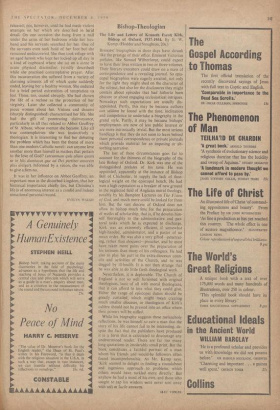Bishop-Theologian
The Life and Letters of Kenneth Eseott Kirk, Bishop of Oxford, 1937-1954. By E. W. Kemp. (Hodder and Stoughton. 20s.) BisBops' biographies in these days have shrunk like the prestige of their office. Eminent Victorian prelates, like Samuel Wilberforce, could expect to have their lives written in two or three volumes. Their literary executors could draw on a mass of correspondence and a revealing journal. So epis- copal biographies were eagerly awaited, not only for the light they might shed on the character of the subject, but also for the disclosures they might contain about episodes that had hitherto been obscure or about engaging ecclesiastical intrigues. Nowadays such expectations are usually dis- appointed. Partly, this may be because authors can seldom be found with the time, inclination and competence to undertake a biography in the grand style. Partly, it may be because bishops' employments are now of less public interest or are more intrinsically trivial. But the most serious handicap is that they do not seem to leave behind them personal correspondence or private journals which provide material for an imposing or ab- sorbing narrative.
The last of these circumstances goes far to account for the thinness of the biography of the late Bishop of Oxford. Dr. Kirk was one of the distinguished prelates of his time. He was appointed, apparently at the instance of Bishop Bell of Chichester, to supply the lack of theo- logical weight on the episcopal bench. He had won a high reputation as a breaker of new ground in the neglected field of Anglican moral theology, notably by his Bampton Lectures on The Vision of God, and much more could be looked for from him. But the vast diocese of Oxford does not allow its bishop much time for the preparation of works of scholarship, that is, if he devotes him- self thoroughly to the administrative and pas- toral tasks which he is expected to discharge. Kirk was an extremely efficient, if somewhat high-handed, administrator, and a pastor of no mean order. He was also a very gifted—penetrat- ing, rather than eloquent—preacher, and he must have taken more pains over the preparation of his sermons than many of his colleagues. He had also to play his part in the extra-diocesan coun- cils and activities of the Church, and he was dogged by ill-health. It is not then strange that he was able to do little fresh theological work.
Nevertheless, it is deplorable. The Church of England is not so well furnished with original theologians, least of all with moral theologians, that it can afford to lose what they could give. Either the range of episcopal duties should be greatly curtailed, which might mean creating much smaller dioceses, or theologians of Kirk's calibre should not be pressed into an office where their powers will be stifled.
While his biography suggests these melancholy reflections, he was himself so rare a man that the story of his life cannot fail to be interesting, de- spite the fact that the publishers have produced it in a form that is calculated to discourage any undetermined reader. There are far too many long quotations in intolerably small print. But the book constitutes a faithful portrait of a man whom his friends and would-be followers often found incomprehensible. As Mr. Kemp says, 'Kirk seemed to delight in finding a roundabout and ingenious approach to problems which others would have tackled more directly.' But anyhow he had a mind of his own, and those who sought to tap his wisdom were never sent away with soft or facile answers.
ALEC \IDLER














































 Previous page
Previous page